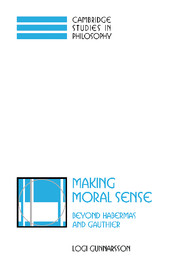Book contents
- Frontmatter
- Contents
- Preface
- PART I PROBLEMS
- 1 The justificatory crisis of morality
- 2 Alternative resolutions of the justificatory crisis
- 3 Subjective reasons
- 4 Substantive reasons
- 5 Overcoming rationalism
- PART II AGAINST RATIONALISM
- PART III FOR THE SUBSTANTIVE APPROACH
- PART IV FOR PARTICULARIST SUBSTANTIVISM
- Appendix Transcendental vs. universal pragmatics
- Bibliography
- Index
1 - The justificatory crisis of morality
Published online by Cambridge University Press: 22 September 2009
- Frontmatter
- Contents
- Preface
- PART I PROBLEMS
- 1 The justificatory crisis of morality
- 2 Alternative resolutions of the justificatory crisis
- 3 Subjective reasons
- 4 Substantive reasons
- 5 Overcoming rationalism
- PART II AGAINST RATIONALISM
- PART III FOR THE SUBSTANTIVE APPROACH
- PART IV FOR PARTICULARIST SUBSTANTIVISM
- Appendix Transcendental vs. universal pragmatics
- Bibliography
- Index
Summary
We are honest and truthful, we pay our debts and keep our promises. We are caring and concerned, yet impartial and just. We are sensitive, friendly, merciful, forgiving, generous, thankful, loyal, and self-sacrificing. We are politically conscious and active, and we are respectful of people's rights whatever their gender, race, or sexual orientation. And lately we have even started recycling. In short, we are just great.
Unfortunately, accompanying this feeling of greatness is the nagging worry that we are simply being stupid. The fear is that the very source of our pride is actually a sign of our stupidity: that being moral is, in the final analysis, fundamentally irrational.
There are plenty of reasons to suspect that we are indeed being irrational. I will mention three. The most obvious reason is that being moral often requires us to sacrifice our interests or to act against our desires. We keep our promise to meet somebody for dinner even though we would much rather do something else. We divide the cake fairly though we want all of it, and we even save our enemies while rather wanting to see them dead. Now if being moral requires us systematically to act against our desires in this way, how can it be rational?
The second reason for being suspicious about morality does not as such have anything to do with a possible conflict with the satisfaction of desire.
- Type
- Chapter
- Information
- Making Moral SenseBeyond Habermas and Gauthier, pp. 3 - 8Publisher: Cambridge University PressPrint publication year: 2000



